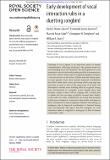Early development of vocal interaction rules in a duetting songbird
Abstract
Exchange of vocal signals is an important aspect of animal communication. Although birdsong is the premier model for understanding vocal development, the development of vocal interaction rules in birds and possible parallels to humans have been little studied. Many tropical songbirds engage in complex vocal interactions in the form of duets between mated pairs. In some species, duets show precise temporal coordination and follow rules (duet codes) governing which song type one bird uses to reply to each of the song types of its mate. We determined whether these duetting rules are acquired during early development in canebrake wrens. Results show that juveniles acquire a duet code by singing with a mated pair of adults and that juveniles gradually increase their fidelity to the code over time. Additionally, we found that juveniles exhibit poorer temporal coordination than adults and improve their coordination as time progresses. Human turn-taking, an analogous rule to temporal coordination, is learned during early development. We report that the ontogeny of vocal interaction rules in songbirds is analogous to that of human conversation rules.
Citation
Rivera-Cáceres , K D , Quirós-Guerrero , E , Araya-Salas , M , Templeton , C N & Searcy , W A 2018 , ' Early development of vocal interaction rules in a duetting songbird ' , Royal Society Open Science , vol. 5 , no. 2 , 171791 . https://doi.org/10.1098/rsos.171791
Publication
Royal Society Open Science
Status
Peer reviewed
ISSN
2054-5703Type
Journal article
Description
This work was supported by the Maytag Endowment from the University of Miami, a Research Grant from the Animal Behavior Society, a Research Grant from the Organization for Tropical Studies and a Doctoral Dissertation Improvement Grant by the National Science Foundation awarded to K.D.R.-C., and funds from Pacific University and the M.J. Murdock Charitable Trust to C.N.T.Collections
Items in the St Andrews Research Repository are protected by copyright, with all rights reserved, unless otherwise indicated.

